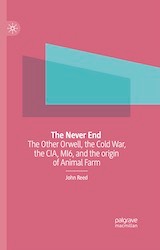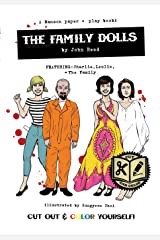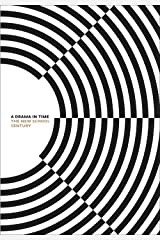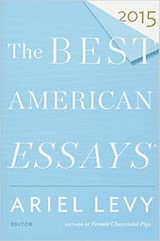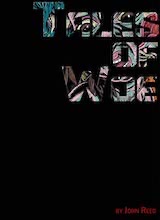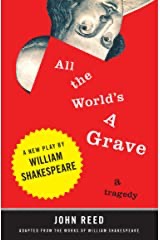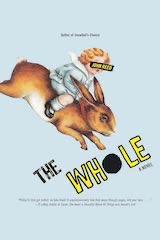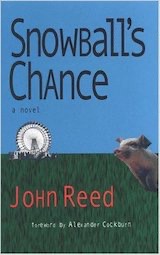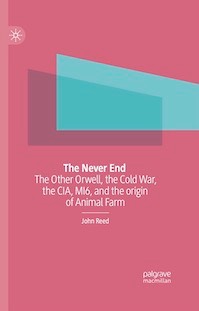PALGRAVE MACMILLAN
Has George Orwell lost his saintly luster? In The Never End, rabble-rouser, dogged investigator, and consummate literary stylist John Reed collects two decades of subject-Orwell findings previously published in PANK, Guernica, Literary Hub, The Brooklyn Rail, The Rumpus, The New York Press, The Believer, Harper’s Magazine, and The Paris Review. Reed’s treatment of Orwell is corrective and peerlessly contemporary; he views Orwell in a twenty-first century global context, considering Orwell’s collaboration with Cold War intelligence operations—US and UK—with unfaltering objectivity. It’s hard to imagine that Orwell—in our own moment of global doublethink—wouldn’t have wanted his devotion to contrariety applied to the literary legacy he left behind. The Never End is at once a hatchet job and a celebration. Animal Farm, based on a previously unknown Russian short story? Animal Farm, deployed by the CIA, MI6 and the Congress for Cultural Freedom? Orwell, turning over blacklists in a McCarthy-esque act of betrayal? The Cold War? Does it last forever? Russia, the “Axis of Evil,” and now China? But. Orwell. Course syllabi. Literary laurels. Snitch. Why do we keep coming back? For the wrong reasons? Or because we know Old Benjamin would want us to know the truth?
Free the piggies! —The New York Pres
Reed has captured the state of the farm today. —The Fort Myers News-Press
A dizzying feat of writing and scholarship. —Lynne Tillman
One plays this terrifying guessing game of animal a clef: which animal am I? Which animal is my neighbor? —Jonathan Ames
A pig returns to the farm, thumbing his snout at Orwell ... the world had a new evil to deal with, and it was not communism. —The New York Times
Snowball, now a capitalist pig, returns to the farm and transforms it into Animal Fair, a garish, polluting theme park, financed by a company called Henron. —Money Magazine
Snowball’s Chance parodies Orwell’s Animal Farm, dragging it kicking and screaming into the twenty-first century. —Publisher’s Weekly
Free the Piggies! Free John Reed! … He not only shanghais Orwell’s story, but amps up and mocks the writer’s famously flat, didactic style—that fairytailish simplicity that ensured Animal Farm a place in high school english classes for the last fifty years. —The New York Press
John Reed challenges us deeply with his elegant September 11 updating of Orwell’s Animal Farm. —Richard Falk
One plays this terrifying guessing game of animal a clef: which animal am I? Which animal is my neighbor? Written in lucid, wise, funny, fable prose. —Jonathan Ames
Reed’s tale, crafted amid Ground Zero’s dust, is chilling in its clarity and inspired in its skewering of Orwell’s stilted style. Whether you liked or loathed the original, there’s no denying Reed has captured the state of the farm today. —The Fort Myers News-Press
Reed has managed to take a dated masterpiece ... and revive it for the odd, casino-like social and political world we’re mired in today; in the process he’s created his own masterpiece. —Creative Loafing, Charlotte
Orwell’s sacred pigs get a proper roast. —The Portland Tribune
Fearless, provocative, and both reverent and irreverent at the same time. —WordRiot
Some books double as a matchstick: if struck in the right conditions, they can cause a wildfire. —The Rumpus
Reed has brought music’s remix culture to literature with stunning results. —largeheartedboy
Reed skewers our early twenty-first century (edgy, tragic, absurd) with a marvelously precise wit. —Locus Magazine
Snowball’s gambit is to turn the farm into a giant spectacle of happiness, and his Animal Fair represents more than just a place: it names an entire ethos. —Guernica
One of the keenest thinkers of our time. —PopMatters
A brilliant and challenging tour de force. Which could be said about every book of his. —Michael Lally
John Reed has been writing hard-to-classify books for over a decade, to great acclaim and sometimes greater notoriety. —Bomb Magazine
This book has something to upset almost everyone who reads it, just like a good book should. —Dennis Loy Johnson
